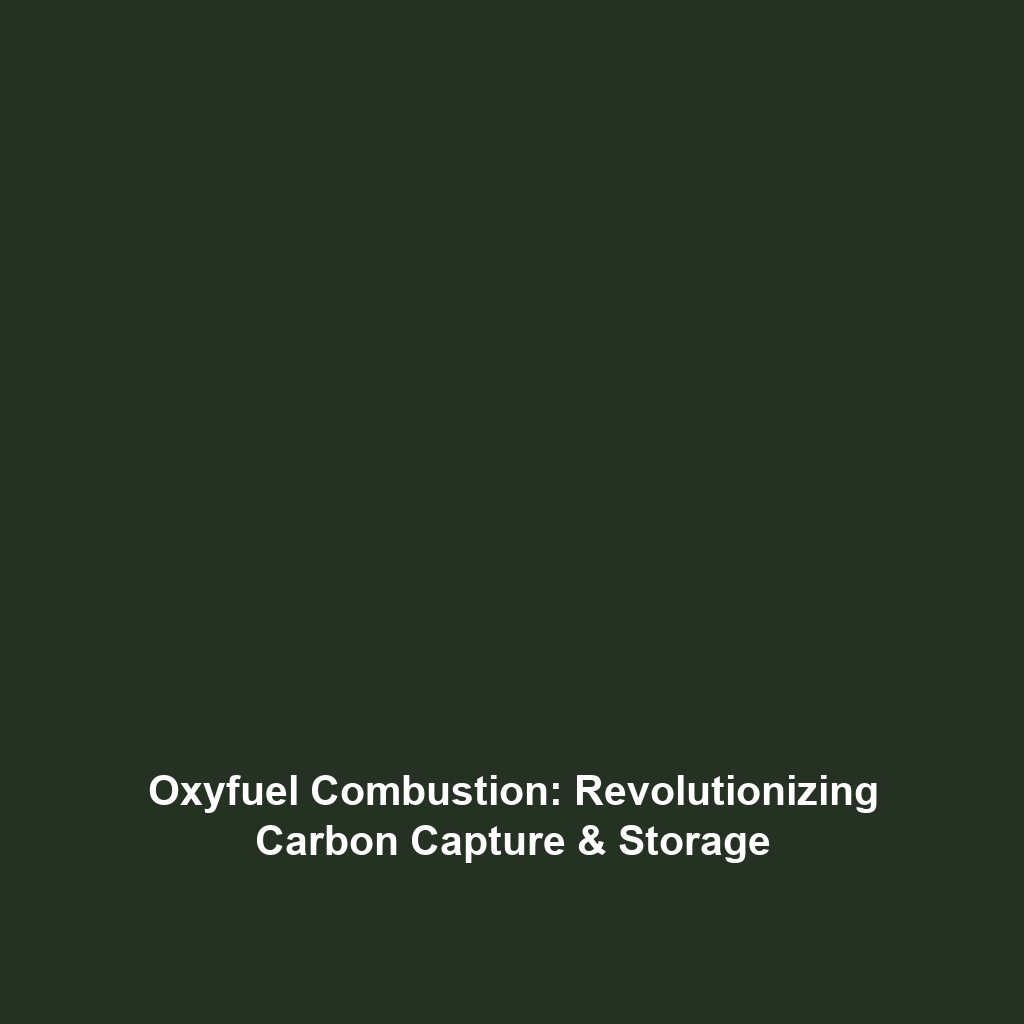Oxyfuel Combustion: A Critical Process in Carbon Capture & Storage
Introduction
Oxyfuel combustion is a revolutionary process that burns fuel in pure oxygen instead of air. This innovative technique produces a flue gas composed primarily of carbon dioxide (CO2) and water vapor, playing a significant role in the realm of Carbon Capture and Storage (CCS). By generating a concentrated stream of CO2, oxyfuel combustion facilitates easier and more efficient capture of greenhouse gases, making it vital for reducing carbon emissions and addressing climate change.
Key Concepts
Understanding Oxyfuel Combustion
In oxyfuel combustion, the conventional air-fuel mixture is replaced with a mixture that includes oxygen at higher concentrations. This adjustment results in higher flame temperatures and improved combustion efficiency. The major components influenced by this method include:
- Fuel Efficiency: Increased combustion efficiency leads to reduced fuel consumption and lower operational costs.
- CO2 Concentration: The flue gas produced is primarily made up of CO2 and water, simplifying the carbon capture process.
- Combustion Control: Enhanced control over combustion processes improves energy generation and pollutant management.
Relationship with Carbon Capture & Storage (CCS)
Oxyfuel combustion is intrinsically linked to CCS strategies, as it significantly lowers the barriers for capturing CO2 from industrial processes. This method highlights the importance of integrating advanced combustion techniques with CCS to achieve ambitious climate goals.
Applications and Real-World Uses
Oxyfuel combustion has broad applications in various sectors, particularly within energy production and manufacturing. Some prominent uses include:
- Power Generation: Oxyfuel combustion is utilized in coal and natural gas power plants to optimize efficiency and reduce carbon emissions.
- Cement Production: The cement industry leverages oxyfuel technology to enhance carbon capture capabilities, reducing its significant environmental impact.
- Metallurgical Processes: In the production of metals, oxyfuel combustion enhances energy efficiency and minimizes CO2 emissions.
These applications demonstrate how Oxyfuel combustion is effectively being used in the context of Carbon Capture & Storage (CCS).
Current Challenges
Despite its advantages, Oxyfuel combustion faces several challenges that hinder widespread adoption:
- Cost of Implementation: The initial setup and technology investment can be prohibitively expensive for some industries.
- Operational Complexity: Managing oxygen and fuel mixtures requires advanced technology and expertise.
- Availability of Infrastructure: Existing infrastructure may require significant adaptation to accommodate oxyfuel technologies.
Future Research and Innovations
Research into Oxyfuel combustion is gaining momentum, with numerous projects aimed at overcoming existing challenges. Innovations focus on:
- Next-Generation Technologies: Development of more efficient burners and CO2 capture systems.
- Alternative Fuels: Exploring the use of renewable and less carbon-intensive fuels in oxyfuel combustion processes.
- Integration with Renewable Power: Combining oxyfuel systems with renewable energy sources to create sustainable energy solutions.
Conclusion
Oxyfuel combustion represents a promising approach in the field of Carbon Capture & Storage (CCS), offering a unique method of burning fuel that leads to more efficient CO2 capture. As technology and strategies continue to evolve, further research and investment in oxyfuel combustion can pave the way for significant improvements in reducing global carbon emissions. For those interested in learning more about innovative carbon reduction techniques, explore our articles on carbon capture technologies and CCS initiatives worldwide.
